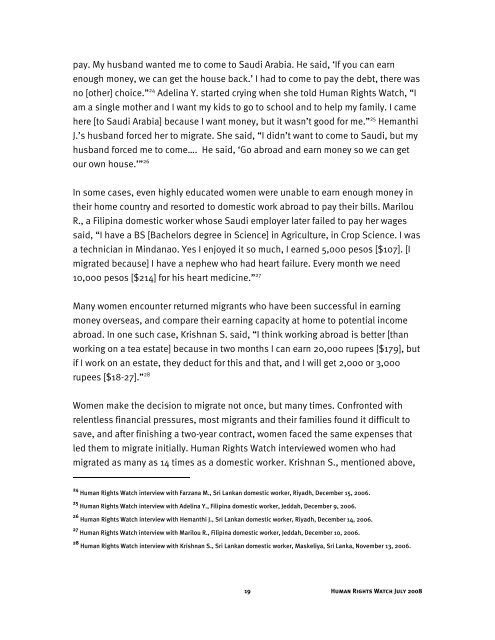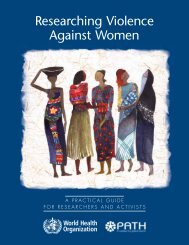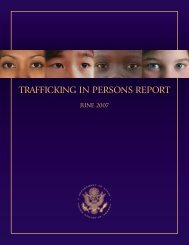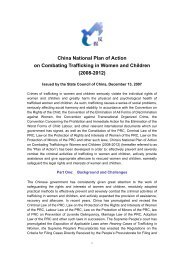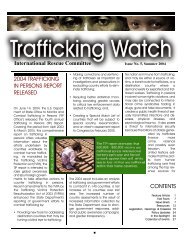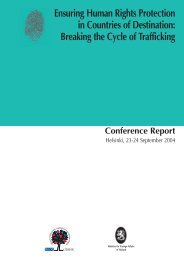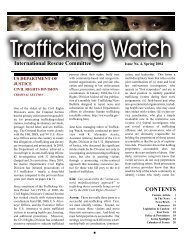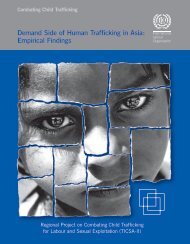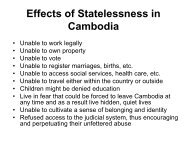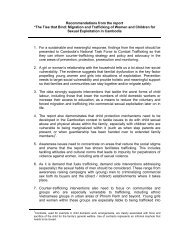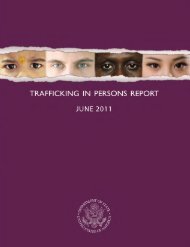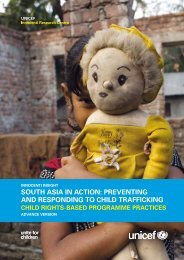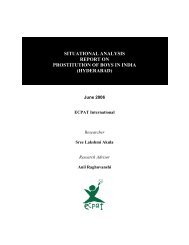âAs If I Am Not Humanâ - Human Rights Watch
âAs If I Am Not Humanâ - Human Rights Watch
âAs If I Am Not Humanâ - Human Rights Watch
Create successful ePaper yourself
Turn your PDF publications into a flip-book with our unique Google optimized e-Paper software.
pay. My husband wanted me to come to Saudi Arabia. He said, ‘<strong>If</strong> you can earn<br />
enough money, we can get the house back.’ I had to come to pay the debt, there was<br />
no [other] choice.” 24 Adelina Y. started crying when she told <strong>Human</strong> <strong>Rights</strong> <strong>Watch</strong>, “I<br />
am a single mother and I want my kids to go to school and to help my family. I came<br />
here [to Saudi Arabia] because I want money, but it wasn’t good for me.” 25 Hemanthi<br />
J.’s husband forced her to migrate. She said, “I didn’t want to come to Saudi, but my<br />
husband forced me to come…. He said, ‘Go abroad and earn money so we can get<br />
our own house.’” 26<br />
In some cases, even highly educated women were unable to earn enough money in<br />
their home country and resorted to domestic work abroad to pay their bills. Marilou<br />
R., a Filipina domestic worker whose Saudi employer later failed to pay her wages<br />
said, “I have a BS [Bachelors degree in Science] in Agriculture, in Crop Science. I was<br />
a technician in Mindanao. Yes I enjoyed it so much, I earned 5,000 pesos [$107]. [I<br />
migrated because] I have a nephew who had heart failure. Every month we need<br />
10,000 pesos [$214] for his heart medicine.” 27<br />
Many women encounter returned migrants who have been successful in earning<br />
money overseas, and compare their earning capacity at home to potential income<br />
abroad. In one such case, Krishnan S. said, “I think working abroad is better [than<br />
working on a tea estate] because in two months I can earn 20,000 rupees [$179], but<br />
if I work on an estate, they deduct for this and that, and I will get 2,000 or 3,000<br />
rupees [$18-27].” 28<br />
Women make the decision to migrate not once, but many times. Confronted with<br />
relentless financial pressures, most migrants and their families found it difficult to<br />
save, and after finishing a two-year contract, women faced the same expenses that<br />
led them to migrate initially. <strong>Human</strong> <strong>Rights</strong> <strong>Watch</strong> interviewed women who had<br />
migrated as many as 14 times as a domestic worker. Krishnan S., mentioned above,<br />
24 <strong>Human</strong> <strong>Rights</strong> <strong>Watch</strong> interview with Farzana M., Sri Lankan domestic worker, Riyadh, December 15, 2006.<br />
25 <strong>Human</strong> <strong>Rights</strong> <strong>Watch</strong> interview with Adelina Y., Filipina domestic worker, Jeddah, December 9, 2006.<br />
26 <strong>Human</strong> <strong>Rights</strong> <strong>Watch</strong> interview with Hemanthi J., Sri Lankan domestic worker, Riyadh, December 14, 2006.<br />
27 <strong>Human</strong> <strong>Rights</strong> <strong>Watch</strong> interview with Marilou R., Filipina domestic worker, Jeddah, December 10, 2006.<br />
28 <strong>Human</strong> <strong>Rights</strong> <strong>Watch</strong> interview with Krishnan S., Sri Lankan domestic worker, Maskeliya, Sri Lanka, November 13, 2006.<br />
19<br />
<strong>Human</strong> <strong>Rights</strong> <strong>Watch</strong> July 2008


